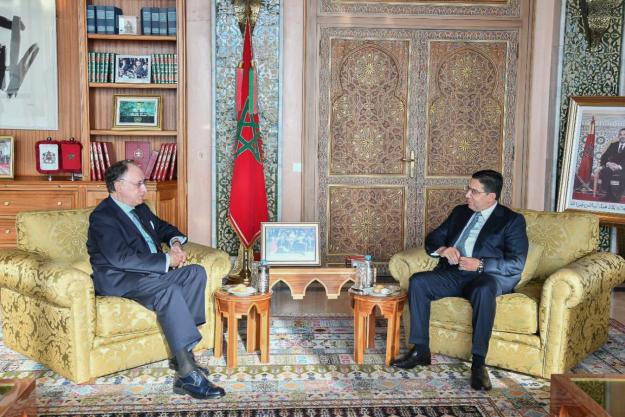The Director-General of the Organisation for the Prohibition of Chemical Weapons (OPCW), Ambassador Fernando Arias, held meetings with Morocco's Minister of Foreign Affairs, African Cooperation and Moroccan Expatriates, H.E. Mr. Nasser Bourita, and the Minister of Higher Education, Scientific Research, and Innovation, H.E. Mr Abdellatif Miraoui, on the sidelines of the first-ever Global Conference on the Role of Artificial Intelligence in Advancing the Implementation of the Chemical Weapons Convention (CWC) , which took place from 22 to 24 October in Rabat, Morocco.
Director-General Arias and Minister Bourita discussed the evolving global security landscape, focusing on key issues related to the threat of use of chemical weapons such as the situations in Syria and Ukraine. Director-General Arias briefed the Minister on OPCW's work priorities for the upcoming years and underlined that achieving universality of the Convention and preventing the re-emergence of chemical weapons remain areas of focus for the Organisation. The two high-level officials underlined that today's rapidly evolving science and technology continues to have a significant impact on the effecte implementation of the Convention. The Director-General highlighted the crucial role of the OPCW Centre for Chemistry and Technology (ChemTech Centre) in enhancing the Organisation's capabilities to monitor developments in science and technology, enhance verification mechanisms and research.
In this relation, both Minister Bourita and Director-General Arias recognised the importance of the Global Conference on the Role of AI in Advancing the Implementation of the CWC.
"Hosting the first-ever Global Conference on Artificial Intelligence and the Chemical Weapons Convention reflects the forward-looking vision that Morocco and the OPCW share in addressing the challenges and opportunities AI presents for the CWC and its States Parties," Minister Bourita said.
He added that Morocco remains convinced that an effective South-South, North-South, and Triangular cooperation will help building AI capacities in developing countries and reduce the digital disparities.
"By uniting our efforts, sharing knowledge, and building partnerships, we can turn AI into a powerful tool for global peace and security. It is our duty to ensure that AI serves as a catalyst for a safer world, where peace and security are preserved for future generations," Minister Bourita concluded.

Ambassador Fernando Arias, Director-General of the OPCW, and H.E. Mr Nasser Bourita, Moroccan Minister of Foreign Affairs, African Cooperation and Moroccan Expatriates






